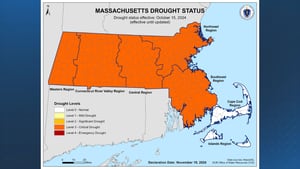Massachusetts is grappling with a significant drought, classified as “Level 3 – Critical Drought” affecting nearly the entire state, with only Cape Cod and the Islands remaining unscathed. After three months of minimal rainfall, state officials are nearing the point of declaring a state of emergency. The drought has precipitated an alarming rise in wildfires, with hundreds of such incidents recorded across the state since early October. As of this week, approximately 37 wildfires are still active, leading to increased concerns for public safety and environmental stability. The state’s Environmental Secretary, Rebecca Tepper, highlighted the dire need for water conservation as an essential measure during this critical period.
The ongoing drought and the resultant fires have prompted state officials to take stringent measures, including banning open flames and charcoal fires in state parks. This decision falls under the jurisdiction of the Department of Conservation and Recreation, which has prioritized fire safety amid worsening conditions. Many local communities have similarly instituted their bans on outdoor fires to mitigate risks. State Fire Marshal Jon M. Davine emphasized that every fire fighter engaged in battling preventable wildfires detracts from resources needed for other emergencies, underscoring the seriousness of the situation.
Massachusetts has experienced an alarming deficit in rainfall, with most regions receiving less than one inch over the past month—3 to 4.5 inches below average for this time of year. Since the onset of dry conditions in August, the rainfall shortfall has reached an alarming 8 to 11 inches across almost the entire state, barring the Cape and Islands. This lack of significant precipitation has exacerbated stress on the region’s water resources, creating a critical need for collective action from residents, municipalities, and businesses, particularly those relying on private wells.
In light of these conditions, Tepper has called for urgent water conservation efforts across the state. She urged residents to engage in both small and large water-saving measures as a way to support public water systems, preserve wildlife habitats, and enhance fire control efforts. The state recognizes that each initiative, no matter how small, contributes to the overall goal of maintaining sufficient clean drinking water and managing environmental resources effectively.
While forecasts suggest some rainfall relief may be on the horizon, officials stress the importance of immediate action to conserve water. Residents are encouraged to adopt aggressive indoor water conservation practices to help stabilize public water supply levels and pressure. The state is working collaboratively with local entities to ensure that policies are in place to support water conservation and fire safety.
The present drought situation in Massachusetts is a stark illustration of the impacts of climate change, which is altering weather patterns and leading to more prolonged periods of dry and warm fall and winter seasons. With the cumulative effect of changing climate inducing severe droughts, local authorities are tasked with a proactive approach toward preventing further environmental degradation and ensuring community safety. Through shared efforts and strategic interventions, there is hope for navigating these unprecedented challenges as Massachusetts strives for drought recovery and environmental sustainability.

